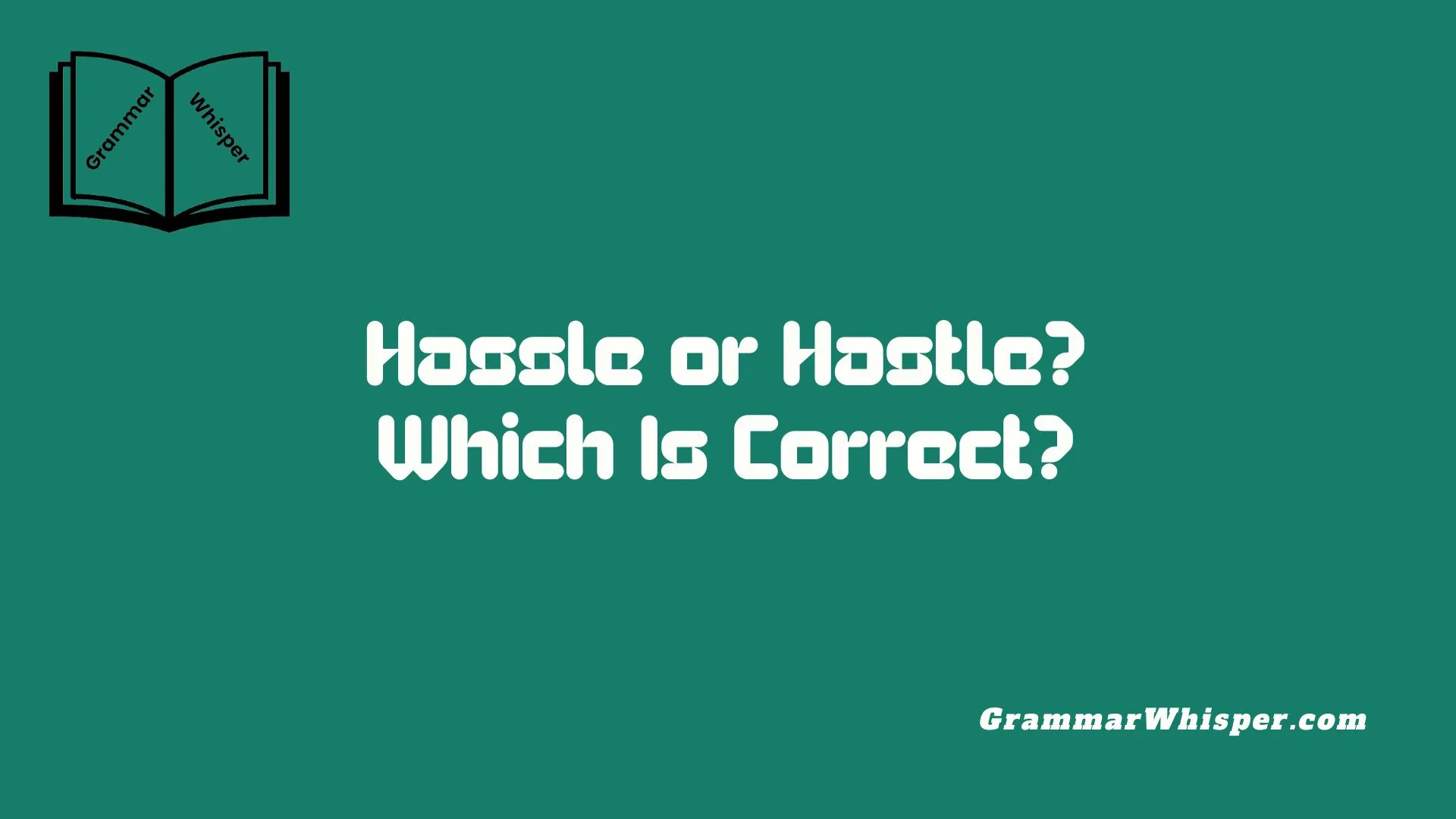As someone who’s helped writers and speakers refine their voice, I’ve seen how a small issue like mixing up Hassle or Hastle creates real confusion. The word “hassle” is the correct spelling; “hastle” is just a misspelling, often a quick typo from similar sounds in casual speech. This kind of mix-up often pops up in texts, social media, and informal writing, where people go with what feels plausible rather than checking a style guide. But here’s the thing – learning to use the right form, and using it properly, shows strong control of English. I’ve seen how even one slip can stand out to readers, especially when trying to sound polished and clear.
If a mistake like this happens in your communication, it may quietly affect your credibility, particularly in professional settings. Some readers may not say anything, but they often notice, even subconsciously. I’ve come to realize these little slip-ups can actually shape how others view your skills. That’s why it’s so important to remember the difference. Keep your writing polished and if in doubt, take a second to wonder. Push past the fog – the answer is usually clear. A single error might feel subtle, but it does matter. And thankfully, with a few easy tips, you’ll lock in the correct usage and move forward with confidence.
What Does “Hassle” Mean?
Hassle can function as both a noun and a verb, each carrying related but distinct meanings.
Hassle as a Noun
- Refers to an annoying or troublesome situation.
- Example: “Getting through airport security was such a hassle.”
- It emphasizes difficulty or inconvenience.
Hassle as a Verb
- Means to bother, annoy, or pester someone.
- Example: “Don’t hassle me while I’m working.”
- It indicates the action of causing trouble or stress.
Quick Table: Hassle as Noun vs Verb
| Part of Speech | Meaning | Example Sentence |
| Noun | Annoying/difficult situation | “The paperwork was a real hassle.” |
| Verb | To bother or annoy | “Stop hassling me about the project.” |
Using hassle properly adds precision to your sentences and prevents confusion.
How to Use “Hassle” Correctly in Sentences
Understanding the meaning is only half the battle. You also want to know how to use hassle naturally.
Examples with Hassle as a Noun
- “Finding parking downtown is always a hassle.”
- “The hassle of moving homes is exhausting but worth it.”
Examples with Hassle as a Verb
- “She hassled him for answers all afternoon.”
- “Don’t hassle the cashier; they’re doing their best.”
Common Mistakes to Avoid
- Don’t write “hassle.”
- Avoid mixing “hassle” with similar-sounding but unrelated words like “hustle.”
- Remember that “hassle” as a verb often takes a direct object (who or what is being hassled).
Grammar Tip
“Hassle” as a verb is typically transitive, meaning it needs an object:
- Correct: “They hassled the witness.”
- Incorrect: “They hassled.”
Etymology and Origin of “Hassle”
Where does “hassle” come from? Understanding the origin gives more depth and context.
- The word “hassle” first appeared in English around the early 20th century.
- It’s believed to originate from a Dutch or Scandinavian word meaning “to fight” or “to struggle.”
The term evolved to describe conflicts, struggles, or bothersome situations, which aligns with how we use it today.
Historical Usage Snapshot:
| Year | Usage Example | Source |
| 1910s | “Don’t give me any hassle.” | Early 20th-century slang |
| 1950s | Became popular in American English slang | Popular culture influence |
This relatively recent origin explains why “hassle” feels informal and conversational, perfect for everyday language.
Why Do People Confuse “Hassle” with “Hastle”?
The confusion isn’t random. Several factors fuel the mix-up.
Phonetic Similarity
The “s” and “t” sounds blur in fast speech, causing some to insert a “t” where none belongs.
Influence of Similar Words
Words like “hustle,” which is correctly spelled with a “t,” might subconsciously influence people to write “hassle.”
Autocorrect and Digital Communication
Smartphone autocorrects or spellcheckers might not catch “hassle” because it resembles other legitimate words or appears frequently enough in user-generated content.
Examples of “Hassle” Misuse
- Social media posts with “hassle” garner thousands of views.
- Informal emails or texts where “hassle” replaces “hassle” unintentionally.
The mix-up spreads quickly because many users don’t realize “hassle” isn’t a real word.
Easy Tricks to Remember the Correct Spelling of “Hassle”
Nobody wants to keep second-guessing spelling every time they write. Here are simple memory aids to lock “hassle” into your brain.
- Think of “hassle” as “has + sle,” where “sle” doesn’t stand for anything but keeps the double “s.”
- Associate “hassle” with the phrase “don’t give me any hassle” – repeat it in your head or out loud.
- Visualize the word: two “s” letters side by side look like a snake’s slither, which fits the idea of a persistent bother.
- Remember it rhymes with “castle” but without the “t.”
- Practice writing sentences aloud, emphasizing the “s” sound, not a “t.”
Quick Mnemonics Table
| Mnemonic Technique | Example/Explanation |
| Word Breakdown | “has + sle” (double s, no t) |
| Rhyming Trick | Rhymes with “castle” but drop the “t” |
| Visual Memory | Double “s” as a snake (persistent hassle) |
| Phrase Association | “Don’t give me any hassle.” |
Hassle in Popular Culture and Media
“Hassle” isn’t just a word in dictionaries. It’s part of everyday speech and appears in popular culture regularly.
- Movies & TV: Characters often say, “What a hassle!” when faced with annoying situations.
- Music: Lyrics sometimes use “hassle” to describe relationship troubles or life struggles.
- Books & Articles: Writers use it to convey everyday frustrations in a relatable way.
For example, the movie “The Devil Wears Prada” uses variations of hassle to show the difficulties in the fashion world. In many sitcoms, characters complain about minor hassles in their lives, making the word familiar and easy to understand.
Summary: Key Takeaways on Hassle vs Hastle
Let’s wrap up the main points:
- “Hassle” is the only correct spelling – never usehahassle.”
- The word can be a noun or a verb, both meaning some kind of trouble or annoyance.
- It originated in the early 1900s, borrowed from Dutch or Scandinavian roots.
- The confusion with “hassle” mainly comes from pronunciation and the influence of similar words like “hustle.”
- Use mnemonics and mental tricks to remember the spelling.
- You’ll see “hassle” frequently in popular culture, which helps reinforce the correct form.
Additional Resources to Perfect Your Spelling
If you want to dive deeper or double-check your usage, here are some trusted references:
| Resource | Link | Description |
| Merriam-Webster Dictionary | merriam-webster.com/dictionary/hassle | Definition and examples |
| Oxford English Dictionary | Historical usage and etymology (subscription needed) | |
| Grammarly Blog | grammarly.com/blog | Tips on common spelling mistakes |
Final Thought
Next time you face a tricky spelling question about hassle vs. hastle, remember this guide. Use the right spelling to keep your writing sharp and your communication clear. No more hassle with “hassle.”
If you want, I can help create quick quizzes or printable cheat sheets to make remembering this even easier. Just say the word!
FAQS:
What is the correct spelling: hassle or hassle?
The correct spelling is hassle. “Hastle” is a common misspelling and is not recognized as a word in English.
Can “hassle” be used as both a noun and a verb?
Yes, hassle can be both a noun and a verb. As a noun, it means an annoying or troublesome situation. As a verb, it means to bother or annoy someone.
Why do people confuse hassle with hassle?
The confusion arises because the pronunciation of “hassle” can sound like it has a “t” sound, and words like “hustle” influence the mistaken spelling of “hassle.” It’s mainly a phonetic and visual mix-up.
Is “hassle” considered informal language?
While often used in casual conversation, hassle is widely accepted in both informal and formal writing to describe difficulties or annoyances.
How can I remember to spell hassle correctly?
Try these tips:
- Remember it rhymes with “castle” but without the “t.”
- Think of the double “s” as a snake slithering through the word.
- Associate it with the phrase “don’t give me any hassle.”











